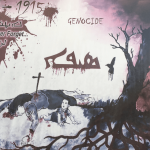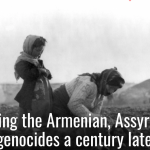By Mina Abdelmalak – RealClearReligion –
As the world struggles to fight back against the coronavirus pandemic, governments across the globe are searching for ways to save as many lives as they can, from instituting curfews and shutting down social clubs and public spaces to releasing nonviolent prisoners. In Egypt, the spread of COVID-19 forced the authorities in mid-March to release 15 political prisoners. Ramy Kamel was not one of them, but he should have been.
Ramy Kamel is a young Coptic Christian man considered by many global religious freedom advocates to be one of Egypt’s most prominent Coptic activists. I’ve known Kamel for more than a decade, and during that time, I’ve watched him grow into a community leader. His journey began after the Maspero massacre in October 2011 when 28 Copts were killed and over 300 were injured. Kamel survived the massacre and not in vain. Soon after, he founded a nonprofit called the Maspero Youth Union to advocate for full civil rights for Egypt’s Coptic Christian community and to document abuses against its members.
The last time I saw Kamel was in early 2019 in Cairo. He shared about the threats he had been receiving from Islamists and some officers from the State security police (equivalent to America’s FBI), all because his ongoing documentation of attacks against Copts had begun to gain international attention.
Kamel had recently been invited to a UN human rights conference in Geneva to speak about the Coptic situation. He never made it. On Nov. 5 2019, Kamel was picked up and taken to the National Security headquarters in Nasr City where he was severely beaten. Authorities were trying to determine his research sources, and also likely trying to intimidate him from participating in the UN Forum. Perhaps that upcoming appearance is what made the authorities in Egypt nervous: that a Coptic voice from Egypt was telling a different story than theirs on the global stage.
Eighteen days later, on Nov. 23, Kamel was arrested again. This time authorities grabbed him from his home around 1:30 a.m. He was beaten and interrogated without legal representation at the Supreme State Security Prosecution in Cairo’s Fifth Settlement neighborhood. Without credible proof, the State Security Prosecution charged him with disturbing the public peace through the misuse of social media, spreading false news, and joining and financing a terrorist group. Kamel has denied all charges. His detention has been automatically renewed without cause at subsequent hearings.
The Coptic community, commonly referred to as Copts, is an ethnoreligious minority in Egypt. It is also the largest Christian community in the Middle East, comprising about 10 percent (100 million) of Egypt’s total population. For decades, Copts have survived religious persecution.
This persecution in Egypt has made the Copts a global community through emigration. The Copts are leaving Egypt because the conditions at home are intolerable. Discrimination is institutionalized. At this point, we are flourishing everywhere but our homeland.
With the arrest of Kamel and other religious freedom defenders, this community continues to suffer in deafening silence. Kamel is a religious freedom defender, not a violent criminal. President al -Sisi needs to empower people like Kamel, not persecute them, if he is serious about promoting religious freedom in Egypt.
Kamel suffers from asthma, putting him at higher risk during the COVID-19 crisis. Keeping him in an overcrowded prison while he is already suffering severe respiratory distress could be a death penalty. The United Nations High Commissioner for Refugees just issued a statement to Egypt, urging them to release more prisoners. And more than 100 nonprofit organizations also signed on to a strong message urging release of prisoners like Kamel.
As a Coptic American, I plead for our president to intercede for Kamel, to ask the Egyptian government to immediately release him from detention and dismiss the charges against him.
We are all concerned with the battle against the coronavirus, but we should not let one of the few voices that speaks on behalf of persecuted Christians in Egypt die silently.
Mina Abdelmalak was born and raised in Egypt and received a law degree from Ain Shams University in Egypt. He worked as a legal researcher for the Egyptian Union of Liberal Youth (EULY), a Cairo-based, non-profit organization, which promotes classical liberalism among Egyptian youth. He supervised a program within EULY on the status of Coptic Christians in Egypt. Mina regularly speaks for and leads advocacy initiatives with the Philos Project.
___________________________
https://www.realclearreligion.org/articles/2020/04/10/covid-19_risk_puts_imprisoned_religious_freedom_advocate_in_greater_danger_488772.html




